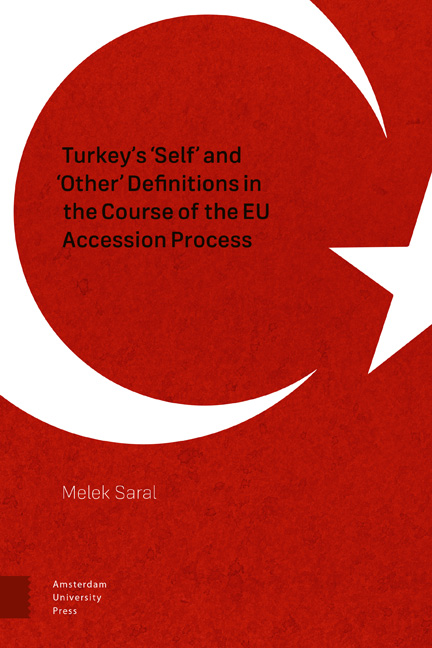Book contents
- Frontmatter
- Contents
- Acknowledgements
- Abbreviations
- 1 Socialization or Estrangement within the Framework of Turkey-EU Relations
- 2 The Concept of Socialization and Identity Change
- 3 New Phase in Turkey-EU Relations: Opening the Door to Europeanness
- 4 The Helsinki Summit: The Recognition of (Muslim) Turkey’s Europeanness
- 5 Start of Negotiations, End of Negotiations
- 6 New Area, New Identity, New Roles: Turkey – European or Middle Eastern?
- 7 Results and Implications
- Bibliography
- Index
7 - Results and Implications
Published online by Cambridge University Press: 12 February 2021
- Frontmatter
- Contents
- Acknowledgements
- Abbreviations
- 1 Socialization or Estrangement within the Framework of Turkey-EU Relations
- 2 The Concept of Socialization and Identity Change
- 3 New Phase in Turkey-EU Relations: Opening the Door to Europeanness
- 4 The Helsinki Summit: The Recognition of (Muslim) Turkey’s Europeanness
- 5 Start of Negotiations, End of Negotiations
- 6 New Area, New Identity, New Roles: Turkey – European or Middle Eastern?
- 7 Results and Implications
- Bibliography
- Index
Summary
Turkey-EU Relations and Turkey's Socialization
Western civilization has always been a very important factor in the formulation of Turkish identity. Thus, Turkey has always put the EU at the center of its political life, regarding it as the end stage of its Westernization, a reliable means for its modernization, and as a place where it really belongs – a place in which it desperately wants to be accepted. Since Turkey regarded the EU as the representative of civilization and modernization and the spokesman for the Western world, it considered the EU to be in a higher position than itself because of its advanced democracy, economy, and sociopolitical structure. However, in spite of these favorable conditions for the strengthening of Western identity and the feeling of in-groupness, evaluating several decades of Turkey's EU-led change in its definition of ‘self’ and ‘other’ does not yield examples of a positive picture. Indeed, the favorable conditions promising a successful shift in Turkey's definitions of ‘self’ and ‘other’ were overridden by the exhaustive and relentless EU negotiation process. Turkey's great desire to join the EU, to be part of the group, and the support of the Turkish politicians and public for EU membership declined dramatically throughout the duration of Turkey-EU relations and reached its low point in the last decade. This was reflected in Turkey's definition of ‘self’ and ‘other.’ Since successful socialization involves a change in identity and a redefinition of ‘self’ and ‘other’ driven by this identity shift, looking at Turkey's identity and its definition of ‘self’ and ‘other’ helps answer also the question whether the interactions with the EU resulted in a successful socialization process or an estrangement.
What is really striking in Turkey's socialization process is that, despite the prior existence of its definition of ‘self’ as European, over the course of relations with the EU, Turkey increasingly defined itself as a Muslim country, a country with a dual identity, belonging to a different, but, in some respects, more advanced civilization. This shift in definition was stronger when the EU was discriminatory and excluded Turkey from the integration process. Parallel to identifying itself as Muslim and belonging to a different civilization, Turkey increasingly viewed the EU as its other.
- Type
- Chapter
- Information
- Publisher: Amsterdam University PressPrint publication year: 2017



